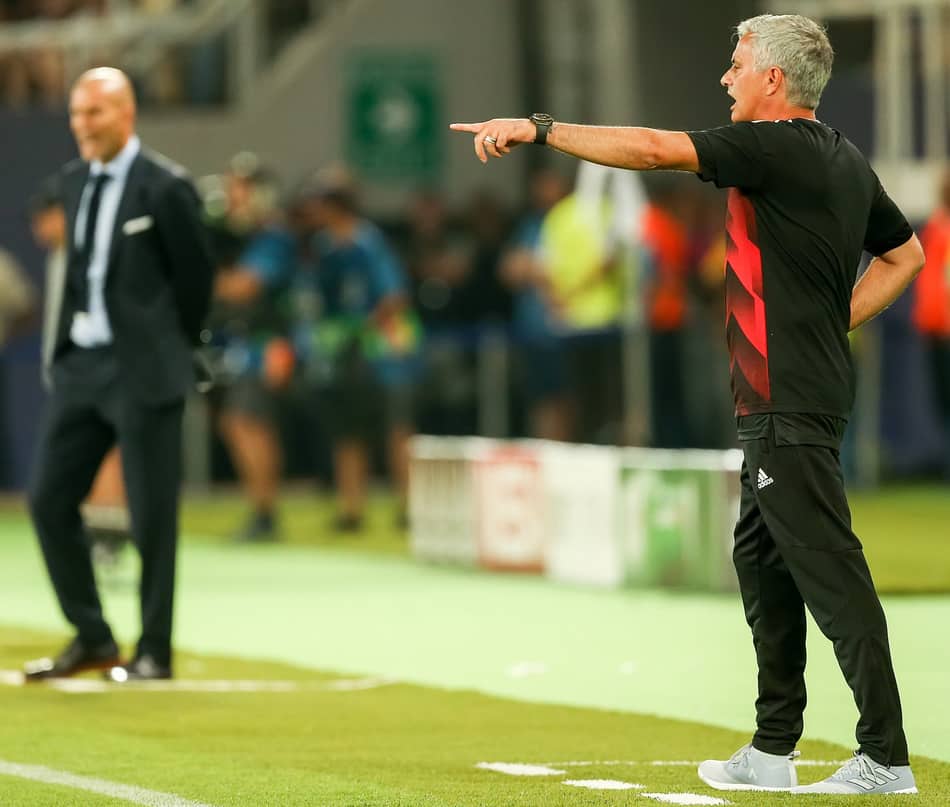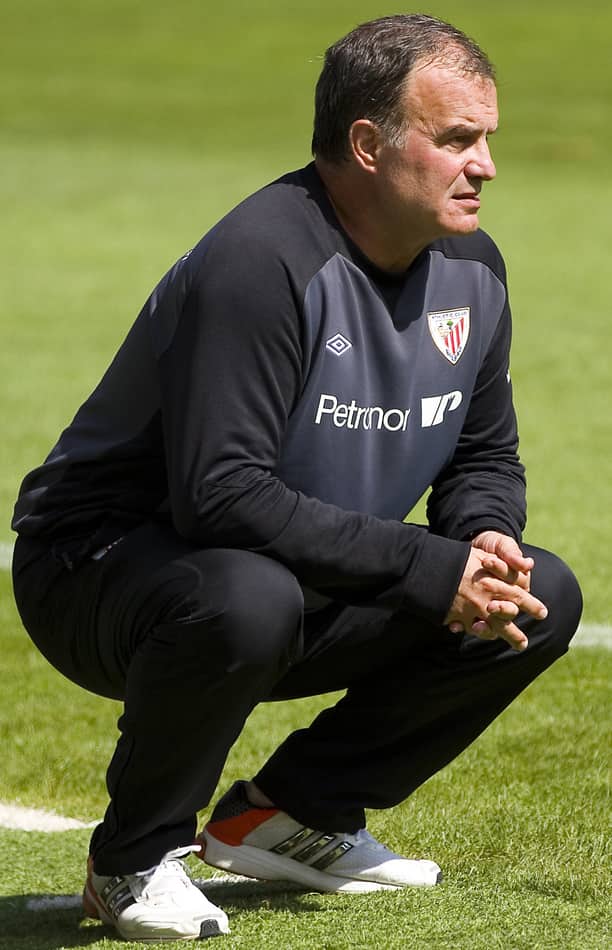I have often been asked about the difference between a manager and head coach. This has led me to writing this blog post to help people understand the fundamental differences between the two.

A football manager has control of many aspects within the club, other than just the first team playing squad. For example, deciding on incoming / outgoing signings, contracts for 1st team and youth team players, and generally overseeing all aspects of running the club. Whilst a head coach will concentrate on preparing the first team for matches without any other responsibilities.
Whilst the above explanation provides you with the general outline of the difference between a manager and head coach, each club will have their own variation of the responsibilities and power given to their coach.
In this blog post I am going to explain, in more detail:
- The responsibilities of the manger and head coach
- Provide an example
- Show the benefits and negatives of each one
Specific responsibilities: Manager v’s head coach
Each role has specific responsibilities with possible variations from club to club. So let’s take a look at these distinctions.
Manager
Manager has long been the title for all coaches, in England, who have been given the responsibility to lead a club. From Bill Shankly, Sir Matt Busby, Brian Clough through to the recent and most successful manager (arguably of all time) Sir Alex Ferguson.
Up until the mid 1990’s, coaches, such as the ones previously mentioned, were undoubtedly the boss. They were, with the exception of the owner, at the top of the hierarchy.
As well as first team duties, managers would also have the following obligations:
- Go to watch potential future signing (usually after a tip off from a scout)
- Be involved in contract negotiations (negotiating with a potential new signing or re-negotiating with a current player)
- Scout other teams for tactical information before playing them
- Decisions on the future of youth team players
- Team travel arrangements
Head Coach

From the mid 90’s, the term head coach was slowly starting to be used when naming a new coach to lead a club. However, unlike a manager, the head coach would not be in charge of the whole club, nor would they be at the top of the hierarchy tree. A head coach will have someone, other than the owner to answer to and has less influence on the running of the club and/or certain football decisions.
Decisions that a head coach may not have control over or has limited influence on may include:
- Transfers (in and out)
- Contracts
- Youth team decisions (first year contracts for example)
On top of these, other responsibilities such as scouting rival teams have been delegated, not only to alternative members of the club but, to a separate department within the club that has its own head of department, respectively. These include:
- Analysis department
- Sports conditioning department
- Scouting department
Now whilst some of these departments will still pass the information onto the head coach, the department for scouting may actually report to the sporting director or director of football who will then decide on the plan of action, regarding recruitment.
Example: Manager
Sir Alex Ferguson was manager of Manchester United for 26 years and was responsible for bringinging countless trophies back to Old Trafford. That said, a lot of this success was built upon his work during his early years at the club which did not involve winning much silverware during this time.
Sir Alex had a long-term plan to not only fix the first team but to build the youth structure as well, which provided many players for the first team over the years. This meant that Sir Alex had his fingerprints on most, if not all, on everything within the club.
In fact there are many players who have spoken about how Sir Alex would visit parents of young players to oversee their development before they were anywhere near the first team.
Even though this may not have applied to his early days at Manchester United, many players have stated that while Sir Alex was always at training, he never actually led any of the training sessions. Sir Alex would watch and keep a close eye on players during training but it was left to his first team coach to lead proceedings.
I even remember at one of my former clubs that the manager would not always be at training and it was left to his assistant to take charge each morning.
Most recently, Mikel Arteta was initially appointed as head coach of Arsenal. However, the club decided to hand Arteta more responsibility and influence within the club and so changed his job title to first team manager.
Example: head coach
In contrast to the Manchester United example of 26 years under one manager, Watford have had 15 different managers over a 10 year period.
This means that any coach that accepts the head coach role at Watford knows they are working with restrictions in terms of implementing a long-term strategy for success.
A relatively short period of bad results will more than likely lead to changes being made and it is up to Cristiano Giretta (Sporting Director) to manage the clubs football operation as a whole and not the current head coach.
Benefits and negatives of a manager / head coach
Everyone will have their own opinion on which model they prefer, manager or head coach, but each model has its own benefits and negatives which may include some of the following.
Benefits of a manager:
- Stability
- Less player power
- Long-term plan
Negatives of a manager:
- Constant changing of styles of football with each appointed manager
- The possible need to overhaul the playing staff with the appointment of a new manager due to the previous point
- Long-term plan ends with the managers reign
Benefits of a head coach:
- Less player turnover after a change of head coach
- Club structure already in place regardless of who is the head coach
- Clear long-term plan set out by the sporting director
Negatives of a head coach:
- Increased player power
- Coach working under restrictions
One of the reasons for this shift from manager to head coach has been the introduction of a sporting director or more commonly known in England as a director of football. The sporting director was and has been widely used throughout Europe before it caught on in the English premier league.
Kenny daglish became one of the first directors of football, at Blackburn Rovers, in 1995 after enjoying a successful spell as manager of the club. At the time the appointment was met with a lot of criticism and many questioned what the role specifically meant.
The fact that Daglish left the role at the end of that season meant it did little for the reputation of a director of football in England.
Since a head coach is interlinked with having a sporting director, it is important to understand exactly what a sporting director does.
What is a sporting director / director of football?
Even though there might be subtle variations of job specificity from club to club, in general the role takes away off the field issues to allow the head coach to focus more on preparing the players for each game. The criteria for a director of football may include:
- Player recruitment
- Contract negotiations
- Responsible for appointing a head coach
List of managers and head coaches in the English Premier League
| Name (club) | Title |
| Brendan Rodgers (Leicester City) | First Team Manager |
| Bruno Lage (Wolves) | Head Coach |
| Claudio Ranieri (Watford) | Head Coach |
| Daniel Farke (Norwich City) | Head Coach |
| David Moyes (West Ham United) | Manager |
| Dean Smith (Aston Villa) | Head Coach |
| Graham Potter (Brighton) | Head Coach |
| Jurgen Klopp (Liverpool) | Manager |
| Marcelo Bielsa (Leeds United) | Head Coach |
| Mikel Arteta (Arsenal) | First Team Manager |
| Nuno Espirito Santo (Spurs) | Head Coach |
| Ole Gunnar Solskjaer (Man Utd) | Manager |
| Patrick Viera (Crystal Palace) | Manager |
| Pep Guardiola (Man City) | Manager |
| Rafael Benitez (Everton) | Manager |
| Ralph Hasenhuttl (Southampton) | Manager |
| Sean Dych (Burnley) | Manager |
| Steve Bruce (Newcastle) | Head Coach |
| Thomas Frank (Brentford) | Head Coach |
| Thomas Tuchel (Chelsea) | Head Coach |
Checkout more blog posts that might interest you on the blog post page.
